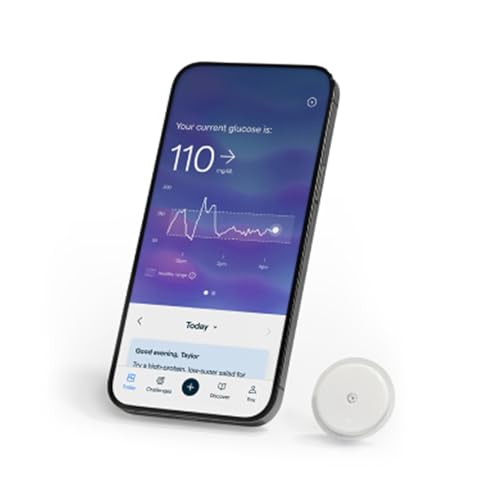Gestational diabetes risks rise if you’re overweight, had it before, or have PCOS. Symptoms like increased thirst or fatigue can signal blood sugar issues, but testing is crucial. Your doctor may use fasting blood sugar or glucose tolerance tests to check levels. Managing blood sugar involves eating balanced meals, exercising regularly, and monitoring with devices like glucometers or CGMs. Keep learning to stay healthy and ensure the best outcome for you and your baby.
Key Takeaways
- Risk factors include previous gestational diabetes, obesity, and PCOS, which increase insulin resistance during pregnancy.
- Early detection involves fasting blood sugar and glucose tolerance tests, following proper preparation for accurate results.
- Monitoring blood sugar levels regularly with devices like glucometers or CGMs helps manage gestational diabetes effectively.
- A balanced diet with lean proteins, healthy fats, fiber, and regular exercise are essential for controlling blood sugar.
- Post-pregnancy, ongoing health checks and lifestyle adjustments are vital to reduce future risks like type 2 diabetes.

Ascensia CONTOUR NEXT GEN Blood Glucose Monitor All-In-One Kit with 20 Test Strips, Accurate Blood Sugar Monitor, Easy-to-Use Glucose Meter, Portable and Reliable Diabetes Testing Kit
CLINICALLY PROVEN ACCURACY: Track and manage your diabetes confidently with our reliable blood glucose monitoring system. Readings that…
As an affiliate, we earn on qualifying purchases.
As an affiliate, we earn on qualifying purchases.
Understanding the Causes of Gestational Diabetes

Gestational diabetes develops when your body can’t produce enough insulin to meet the increased demands of pregnancy. During this time, hormonal changes occur to support placental development, which is vital for your baby’s growth. These hormones, like human placental lactogen and estrogen, can interfere with insulin’s effectiveness, making your body less responsive to its action. As your placenta develops, it produces more of these hormones, which can cause your blood sugar levels to rise if your pancreas can’t keep up. This imbalance is a key cause of gestational diabetes. Essentially, the rapid hormonal shifts and placental growth create a state of insulin resistance where your insulin needs increase considerably, and if your body doesn’t adapt quickly enough, gestational diabetes can develop. Hormonal fluctuations also play a significant role in influencing insulin resistance during pregnancy. Understanding the hormonal balance and how it affects insulin function can help in managing and preventing this condition effectively.

Lingo Continuous Glucose Monitor (CGM) & App. Made by Abbott. Know the impact of what you eat. 1 Lingo biosensor lasts up to 14 Days*. Works with iOS and Android. US Only.
WORKS WITH iOS AND ANDROID.
As an affiliate, we earn on qualifying purchases.
As an affiliate, we earn on qualifying purchases.
Recognizing the Risk Factors and Symptoms

Since hormonal changes during pregnancy can cause blood sugar levels to rise when the body can’t produce enough insulin, it’s important to be aware of who might be at higher risk. High risk groups include women with a history of gestational diabetes, obesity, or polycystic ovary syndrome. Recognizing early warning signs helps you catch issues early; these include increased thirst, frequent urination, fatigue, blurred vision, and unexplained nausea. If you belong to a high risk group or notice these symptoms, notify your healthcare provider promptly. Being aware of your risk factors and early warning signs empowers you to seek timely support and manage potential complications effectively. Additionally, understanding the role of insulin resistance can help you better grasp how gestational diabetes develops. Blood sugar regulation is a complex process influenced by hormonal changes, and staying vigilant guarantees better health for you and your baby throughout pregnancy. Recognizing sugar level fluctuations can further aid in early detection and management of the condition.

Metene TD-4116 Blood Glucose Monitor Kit, 100 Glucometer Strips, 100 Lancets, 1 Blood Sugar Monitor, Blood Sugar Test Kit with Control Solution, Lancing Device, No Coding, Large Display
Advanced Glucometer Kit: metene TD-4116 diabetes testing kit is equipped with advanced technologies, brings more accurate and reliable…
As an affiliate, we earn on qualifying purchases.
As an affiliate, we earn on qualifying purchases.
How Doctors Test for Gestational Diabetes

To check for gestational diabetes, your doctor will likely start with a fasting blood sugar test to see how your body manages glucose. You might also take a glucose tolerance test, where you’ll drink a sugary solution, and your blood will be tested at intervals. Throughout your pregnancy, your doctor will monitor your blood sugar levels to make certain everything stays on track. Incorporating data-driven strategies can help ensure accurate diagnosis and effective management. Recognizing the importance of early detection can also improve outcomes for both mother and baby.
Glucose Tolerance Test
Doctors typically use the Glucose Tolerance Test to determine if you have gestational diabetes. This test measures your body’s ability to process glucose, helping your healthcare provider assess your glucose tolerance. Before the test, you’ll need to follow specific test preparation instructions, such as fasting for about 8 to 14 hours. On the day of the test, you’ll drink a sweet, glucose-rich solution provided by your doctor. Afterward, your blood will be drawn at intervals to monitor how your body handles the sugar. The results will show whether your blood sugar levels are within a healthy range or indicate gestational diabetes. Proper test preparation guarantees accurate results, so be sure to follow your doctor’s instructions carefully.
Fasting Blood Sugar
Fasting Blood Sugar is a simple blood test that helps your healthcare provider check how well your body manages glucose after an overnight fast. It measures your blood sugar levels when you haven’t eaten for at least 8 hours. This test provides valuable information about your fasting levels, indicating how effectively your body regulates blood sugar without recent food intake. Elevated fasting blood sugar levels can signal insulin resistance or issues in glucose metabolism, which are important for diagnosing gestational diabetes. The test is quick and straightforward—just a blood sample drawn from your arm. Your fasting blood sugar results help your doctor determine if further testing is necessary and guide your treatment plan to keep both you and your baby healthy during pregnancy. Additionally, understanding the key domains of development can help monitor your overall health during pregnancy.
Monitoring Throughout Pregnancy
Monitoring for gestational diabetes involves a series of tests throughout your pregnancy to guarantee blood sugar levels stay within healthy ranges. These tests help track your blood sugar patterns, revealing how your body responds to food and insulin. Regular monitoring can identify fluctuations that might affect your health or your baby’s development. It’s normal to experience emotional impacts, such as anxiety or frustration, especially when measurements seem inconsistent. Staying informed about your blood sugar levels helps you and your healthcare provider make timely adjustments to your diet, exercise, or medication if needed. Consistent testing provides reassurance, reduces uncertainties, and supports a healthier pregnancy. Utilizing real-time monitoring systems can enhance the accuracy and immediacy of blood sugar tracking. Incorporating patient education about proper testing techniques can also improve the reliability of your results. Proper blood sugar control is essential to reduce the risk of complications during pregnancy and delivery. With close monitoring, you can manage gestational diabetes effectively and minimize risks for both you and your baby.

Metene TD-4116 Blood Glucose Monitor Kit, 100 Glucometer Strips, 100 Lancets, 1 Blood Sugar Monitor, Blood Sugar Test Kit with Control Solution, Lancing Device, No Coding, Large Display
Advanced Glucometer Kit: metene TD-4116 diabetes testing kit is equipped with advanced technologies, brings more accurate and reliable…
As an affiliate, we earn on qualifying purchases.
As an affiliate, we earn on qualifying purchases.
Nutrition Tips for Managing Blood Sugar Levels

Managing blood sugar levels during pregnancy requires making smart nutrition choices. Focus on balanced meal planning that includes lean proteins, healthy fats, and fiber-rich carbs to keep blood sugar stable. Incorporate snack ideas like nuts, Greek yogurt, or veggie sticks to prevent dips in energy. To help you choose wisely, here’s a simple guide:
| Food Type | Examples | Benefits |
|---|---|---|
| Protein | Eggs, chicken, tofu | Stabilizes blood sugar |
| Fiber-rich carbs | Whole grains, vegetables | Slows sugar absorption |
| Healthy fats | Avocado, nuts | Supports satiety |
Stick to small, frequent meals and avoid sugary snacks. Proper planning helps manage your blood sugar effectively. Additionally, regularly assessing your blood sugar levels can help you make informed dietary adjustments. Staying aware of AI security developments can also help ensure your digital health tools remain safe and reliable. Moreover, understanding the horsepower of electric dirt bikes can inspire motivation for physical activity, which benefits overall health during pregnancy.
Incorporating Exercise Into Daily Routine

Incorporating exercise into your daily routine is a vital step for controlling blood sugar levels during pregnancy. Regular exercise routines help your body use insulin more effectively and maintain stable blood glucose. You don’t need intense workouts; simple activities like walking, swimming, or prenatal yoga are excellent options. Aim for at least 30 minutes of moderate activity most days of the week, but always listen to your body and avoid overexertion. Breaking your daily activity into shorter sessions can make it easier to stay consistent. Yoga can be a gentle and effective way to incorporate movement while promoting relaxation and mindfulness. Incorporating lifestyle modifications such as regular activity can significantly improve your blood sugar management. Consistency is key—regular movement helps manage gestational diabetes and improves your overall well-being. Additionally, maintaining physical activity supports cardiovascular health and reduces stress during pregnancy. Before starting any new exercise routine, consult your healthcare provider to ensure your plan is safe for you and your baby.
Monitoring Blood Glucose: Tools and Techniques

To effectively manage your blood sugar levels, you need reliable tools to monitor your glucose. Glucose monitoring devices make tracking easy and accurate, giving you real-time insights into your blood sugar patterns. Using these techniques consistently helps you stay on top of your health and make informed decisions. Regularly checking your blood glucose hours today list ensures you can respond promptly to changes and maintain optimal control. Additionally, choosing a device with HEPA filtration or other advanced features can help improve overall air quality in your home environment.
Glucose Monitoring Devices
Have you ever wondered how pregnant women with gestational diabetes keep track of their blood sugar levels? Modern glucose monitoring devices make it easier and more convenient. You might use:
- Smartphone apps that sync with your devices, providing real-time data and trend analysis
- Continuous glucose monitors (CGMs) that track your blood sugar levels throughout the day without finger pricks
- Traditional glucometers for quick, accurate readings when needed
These tools help you stay on top of your blood sugar, giving you valuable insights to manage your condition effectively. With the integration of smartphone apps and CGMs, you can monitor your levels more seamlessly, reducing the stress of frequent testing. Staying connected to your data empowers you to make informed daily decisions.
Effective Blood Sugar Tracking
Effective blood sugar tracking relies on choosing the right tools and techniques to monitor your levels consistently. Accurate readings depend on reliable devices and proper testing methods. To improve blood sugar accuracy and tracking consistency, use a glucose meter approved by your healthcare provider, and always follow the manufacturer’s instructions. Keep your testing supplies clean and stored properly. Record your results daily to identify patterns and make informed decisions. Consider using a logbook or digital app for easy tracking and trend analysis. Below is a helpful comparison:
| Method | Benefits |
|---|---|
| Fingerstick Testing | Quick, portable, high accuracy |
| Continuous Glucose Monitor | Less invasive, real-time data |
| Regular Records | Enhances tracking consistency |
| Proper Technique | Ensures blood sugar accuracy |
Long-term Health Considerations After Pregnancy

After experiencing gestational diabetes, you face increased long-term health risks that require ongoing attention. Maintaining your post pregnancy health is essential to reduce future problems. These long term risks include a higher chance of developing type 2 diabetes, cardiovascular issues, and metabolic syndrome. Staying proactive helps you manage these risks effectively.
To protect your health, consider:
- Regular blood sugar screenings and checkups
- Maintaining a balanced diet and active lifestyle
- Monitoring weight and blood pressure over time
Frequently Asked Questions
Can Gestational Diabetes Affect My Baby’s Health After Birth?
Yes, gestational diabetes can affect your baby’s health after birth. It increases neonatal risks like low blood sugar, breathing issues, and jaundice. Additionally, your baby might face developmental concerns later, such as a higher chance of obesity or type 2 diabetes. Managing your blood sugar levels during pregnancy helps reduce these risks, so follow your healthcare provider’s advice closely to protect your baby’s health both now and in the future.
Are There Any Natural Remedies to Prevent or Manage Gestational Diabetes?
Think of your body as a garden needing careful tending. While natural remedies like herbal supplements might help, they shouldn’t substitute medical advice. Instead, focus on dietary changes—adding fiber-rich foods and reducing sugar—to nurture your health. These practical steps act as sunlight and water, supporting your body’s balance during pregnancy. Always consult your healthcare provider before trying herbal supplements to ensure safety for you and your baby.
How Does Gestational Diabetes Impact Future Pregnancies?
You should know that gestational diabetes can increase your long-term risks, like developing type 2 diabetes later on. It also affects your future pregnancies, raising the chances of complications such as preeclampsia or delivering a larger baby. To minimize these risks, focus on healthy eating, regular exercise, and managing blood sugar levels. Keep monitoring your health, and consult your healthcare provider for personalized guidance on future pregnancies.
What Emotional Challenges Might I Face With Gestational Diabetes?
Dealing with gestational diabetes can feel like riding a roller coaster—you’ll face ups and downs emotionally. You might experience anxiety about your baby’s health or frustration over managing your blood sugar. Building emotional resilience helps you stay strong, while effective anxiety management techniques, like deep breathing or talking with loved ones, ease the stress. Remember, it’s okay to seek support; you’re not alone in this journey.
Are There Support Groups for Women Managing Gestational Diabetes?
Yes, you can find support groups for women managing gestational diabetes through peer support and online communities. These groups offer a safe space to share experiences, ask questions, and get advice from others going through similar challenges. Joining such communities can help you feel less alone, boost your confidence, and provide practical tips for daily management. Look for reputable forums, social media groups, or local meetups to connect with others.
Conclusion
Managing gestational diabetes is like tending a delicate garden—you need to stay attentive and proactive. By understanding the risks, following your testing schedule, and making healthy choices, you can keep your blood sugar in check. Remember, you’re not alone on this journey, and each small step is like watering a seed that will grow into a healthy future for you and your baby. Stay informed, stay empowered, and enjoy the process of nurturing your well-being.









